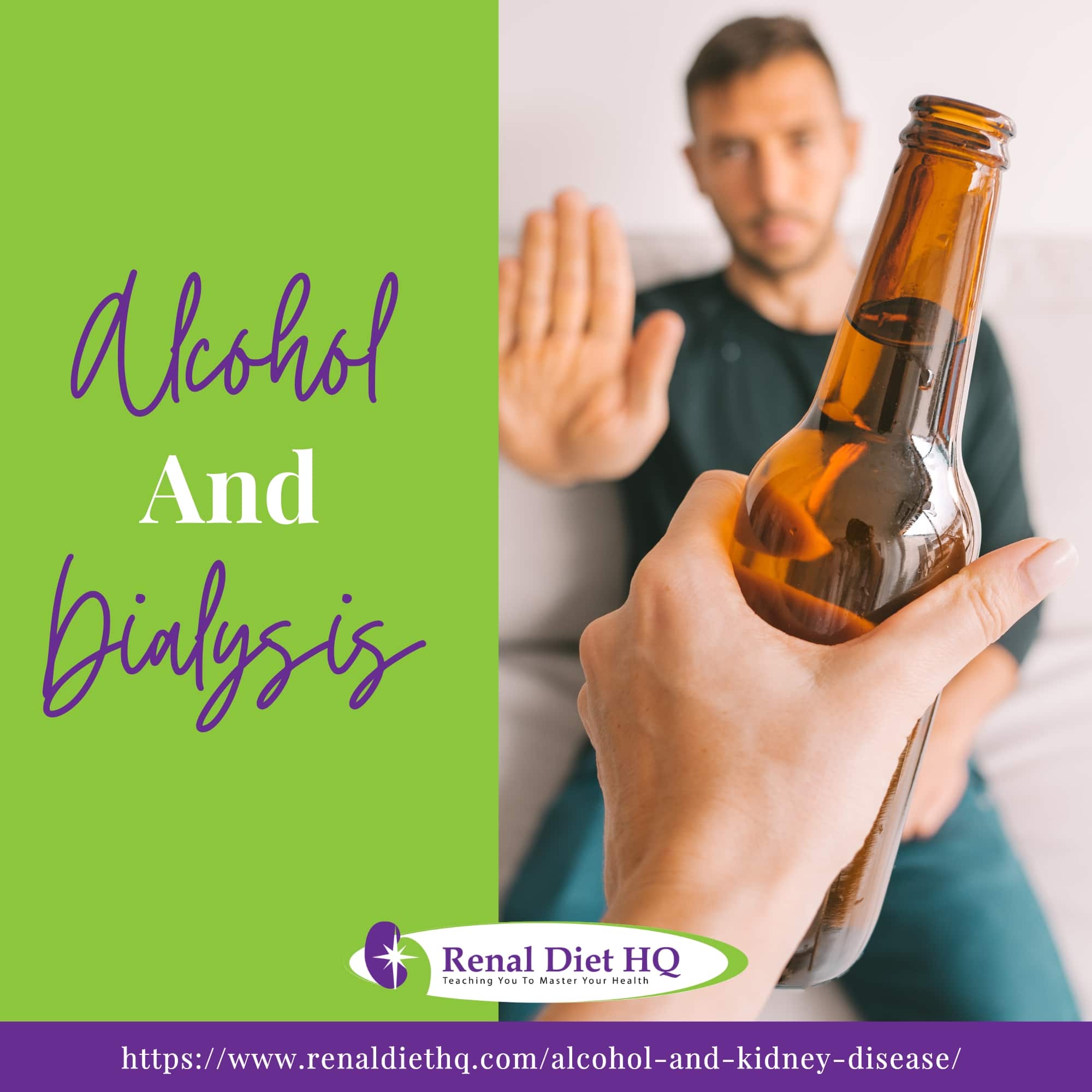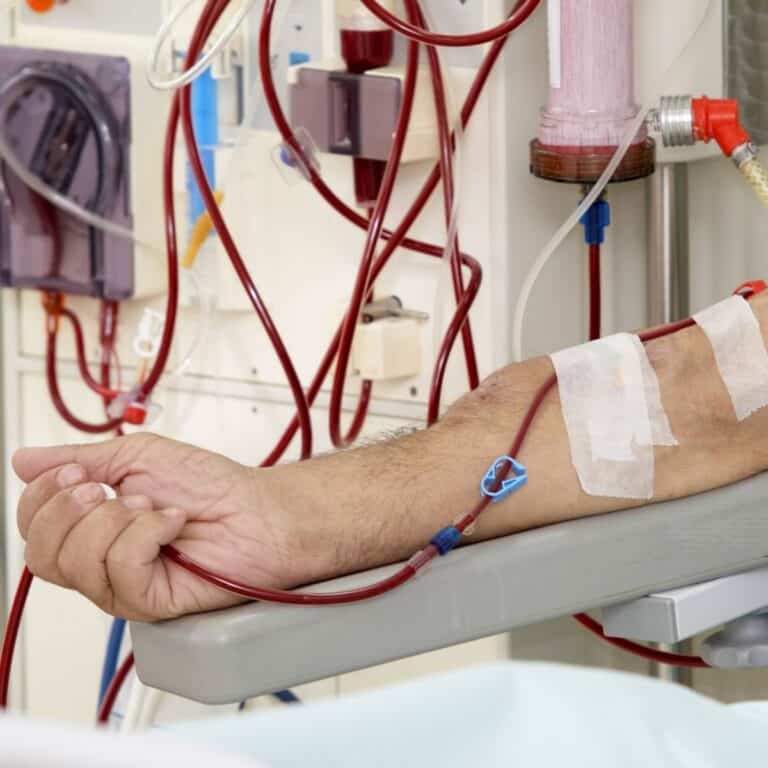Alcohol and Dialysis
Navigating the complexities of dietary choices is crucial for kidney patients with advanced chronic kidney disease (CKD) undergoing dialysis.
One area that demands careful consideration is the consumption of alcohol. As dialysis patients manage their health and treatment, understanding the impact of alcohol on their condition becomes essential.
This article delves into the relationship between alcohol and dialysis, shedding light on the potential risks and considerations. Exploring the effects of alcohol on kidney function, interactions with medications, and the importance of moderation.
This article aims to provide a comprehensive understanding of how alcohol fits into the lives of those undergoing dialysis treatment.

Key Takeaways
- Alcohol consumption, both acute and chronic, can harm kidney function, especially in conjunction with liver disease.
- Kidney structure and function can be compromised by alcohol, affecting fluid and electrolyte balance.
- Diabetes and dialysis patients are particularly vulnerable to alcohol's toxic effects, exacerbating complications and treatment efficiency.
- Alcohol can accelerate progression of Chronic Kidney Disease (CKD), worsen hypertension, dehydration, and inflammation, and disrupt diabetes management.
- Collaborating with healthcare professionals is essential for dialysis patients to establish safe alcohol consumption limits and mitigate potential risks.
Jump to:
- Key Takeaways
- Understanding the Connection Between Alcohol and Kidney Health
- Alcohol Consumption: Impact on Diabetic Dialysis Patients
- Decoding the Relationship Between Alcohol Intake and Kidney Disease
- Complications of Alcohol Consumption in CKD Patients
- Understanding the Risks of Alcohol for Dialysis Patients
- Medication Interactions of Alcohol for Dialysis Patients
- The Impact of Regular Alcohol Consumption
- How Liver Failure Can Lead to Kidney Failure
- Alcohol Consumption and Dialysis
- Fluid Restriction and Alcohol Consumption For Dialysis Patients
- Alcohol Alternatives for Social Drinking
- FAQs for Alcohol and Kidney Disease
- Moderation Is Key When It Comes To Alcohol And Your Kidney Health
Understanding the Connection Between Alcohol and Kidney Health
The connection between alcohol consumption and kidney health is a complex and concerning issue. Both acute and chronic alcohol intake can have detrimental effects on kidney function, particularly when combined with pre-existing liver disease.
Research has identified structural and functional changes in the kidneys caused by alcohol, leading to compromised regulation of fluid volume and electrolyte balance. Chronic alcohol consumption can result in lowered blood concentrations of essential electrolytes and disrupt the body's acid-base balance.
Moreover, alcohol interferes with hormonal controls that govern kidney function, exacerbating the negative impact. The implications are further exacerbated by alcohol-induced liver disease, which magnifies the harm inflicted on the kidneys. This includes impaired handling of sodium and fluids, and in severe cases, acute kidney failure.
Understanding the intricate relationship between alcohol and kidney health underscores the importance of making informed choices, particularly for individuals undergoing dialysis. Moderating alcohol consumption is crucial, as excessive drinking not only compromises kidney function directly but also compounds the risk posed by underlying liver conditions.
To safeguard overall health, those undergoing dialysis treatment must consider the implications of alcohol intake (renal diet and alcohol) on their kidney function and collaborate closely with healthcare professionals such as a dialysis dietitian to establish responsible guidelines.
For More Recipes and Ideas --->> Get Your Free Meals and Recipes That Are Perfect for Pre-Dialysis Diets, Pre-Dialysis with Diabetes, or Dialysis Diets.

Alcohol Consumption: Impact on Diabetic Dialysis Patients
It's crucial to understand the effects of drinking on individuals undergoing treatment for diabetes. Alcohol's toxicity can exacerbate diabetic complications, reducing dialysis efficiency and necessitating treatment alterations.
The impact of alcohol on patient lifestyle is profound, often leading to poorer health outcomes. Use these tips for finding steps to improving kidney health.
Here's a brief table showing some primary concerns:
| Alcohol's Toxicity | Diabetic Complications | Dialysis Efficiency |
| Can damage liver and pancreas | High blood sugar levels may be harder to control | Dialysis has reduced efficacy in filtering toxins |
| May cause hypoglycemia | Increased risk of nerve damage and cardiovascular disease | Inefficient dialysis may cause waste build-up |
| Can lead to unhealthy weight gain or loss | Excessive drinking may lead to kidney disease | Heavy drinking can speed up kidney damage |
These issues highlight why it's essential for you as a caregiver (avoid caregiver burnout), family member, or friend, to monitor the patient's lifestyle closely. Encourage them towards healthier habits while they're dealing with this life-altering condition.
It isn't easy; it involves empathy and understanding from your end. But remember: every small change contributes significantly towards better health outcomes for these patients.
Decoding the Relationship Between Alcohol Intake and Kidney Disease
Chronic Kidney Disease is a progressive condition where the kidneys' ability to filter waste and regulate fluid and electrolyte balance becomes impaired over time.
CKD is classified into stages based on the estimated glomerular filtration rate (eGFR), with advanced stages indicating severe kidney dysfunction. It can result from various factors, including high blood pressure, diabetes, and certain lifestyle choices.
In the context of CKD, the relationship between alcohol intake and kidney disease is complex. While light to moderate alcohol consumption might not pose significant risks for individuals with healthy kidneys, heavy and chronic alcohol use has been associated with accelerated progression of CKD.
Excessive alcohol consumption can contribute to hypertension, dehydration, and inflammation, all of which are risk factors to worsening kidney function. Moreover, alcohol's impact on blood pressure regulation and its potential to exacerbate conditions like diabetes can further compromise kidney health.
Research has shown that heavy alcohol consumption is linked to a higher risk of developing kidney disease and experiencing faster disease progression in those already affected by CKD.
Therefore, for individuals with CKD, especially those in advanced stages or on dialysis, careful consideration of alcohol consumption is essential. Collaborating with healthcare professionals such as your renal dietitian to determine safe limits and potential risks is crucial to mitigating the negative impact of alcohol on kidney health.
Complications of Alcohol Consumption in CKD Patients
Alcohol consumption can introduce a host of complications in kidney disease patients, exacerbating their already compromised kidney function. The kidneys play a critical role in filtering waste and maintaining fluid and electrolyte balance, and CKD impairs these functions. Excessive alcohol intake can significantly worsen the condition.
Firstly, alcohol is a potent diuretic, leading to dehydration and electrolyte imbalances in kidney disease patients who are already prone to fluid retention. Dehydration strains the kidneys, impeding their ability to filter waste effectively.
Additionally, alcohol can elevate blood pressure, a common complication of CKD. High blood pressure further damages kidney function and accelerates disease progression.
Furthermore, alcohol metabolism produces toxins that need to be processed by the liver and excreted by the kidneys. In CKD patients, this process is compromised, potentially leading to the accumulation of harmful substances in the bloodstream.
Alcohol's impact on blood sugar regulation can also worsen diabetes, a leading cause of CKD.
Considering these complexities, CKD patients must be cautious with alcohol consumption. Even moderate drinking can increase the burden on already weakened kidneys, potentially accelerating disease progression and complicating management.
Collaborating closely with healthcare professionals including your dialysis dietitian to establish safe alcohol limits is crucial to avoid exacerbating kidney damage and related complications.
Understanding the Risks of Alcohol for Dialysis Patients
Dialysis is a medical procedure used to replicate the essential functions of the kidneys in individuals with impaired kidney function, specifically End-Stage Renal Disease (ESRD) or severe Chronic Kidney Disease. These are great tips on how to prevent end stage renal disease.
Dialysis serves as a life-saving intervention by removing waste products, excess fluids, and electrolytes from the bloodstream when the kidneys are unable to perform these tasks adequately.
Alcohol consumption can significantly impact the efficacy and safety of the dialysis process. The kidneys and liver both play vital roles in metabolizing alcohol and filtering waste products.
For dialysis patients, whose kidneys are already compromised, the liver assumes a larger role in alcohol metabolism. However, excessive alcohol intake can burden the liver and potentially lead to further damage, hindering its ability to process toxins and medications.
Furthermore, alcohol's diuretic effect can worsen fluid imbalances in dialysis patients, potentially causing dehydration or fluid overload between dialysis sessions. This can strain the cardiovascular system and complicate blood pressure control.
Alcohol's interference with hormone regulation and electrolyte balance can also exacerbate the challenges dialysis patients already face in maintaining stable health.
Given the intricate interaction between alcohol, kidneys, liver, and medications in dialysis patients, it is essential to approach alcohol consumption with caution and under the guidance of healthcare professionals.
Making informed decisions about alcohol intake, considering its potential impact on the dialysis process and overall health, is crucial to ensuring the best possible outcomes for individuals undergoing this life-sustaining treatment.
Medication Interactions of Alcohol for Dialysis Patients
Dialysis patients with End-Stage Renal Disease (ESRD) already face complex medication regimens to manage their health as most of them have multiple medical conditions.
When alcohol is introduced into this equation, potential interactions of medications with alcohol can arise, leading to adverse effects and compromised treatment outcomes.
Alcohol can interact with medications metabolized by the liver or affect the way drugs are processed in the body. For dialysis patients, whose kidneys and liver might already be compromised, these interactions can be particularly problematic.
Renal patients already require adjustments in medications that differ from that of a healthy person. Alcohol can alter drug absorption, distribution, metabolism, and elimination, leading to unexpected fluctuations in medication levels.
Dialysis patients often take medications to manage blood pressure, regulate electrolyte imbalances, and control complications arising from kidney dysfunction. Alcohol's impact on blood pressure levels can interact with antihypertensive medications, causing hypotension or rendering the medication less effective.
Moreover, alcohol can interfere with medications that help maintain proper balance of fluid, a critical concern for dialysis patients.
In addition, large amounts of alcohol affect drug metabolism in the liver, potentially leading to increased drug levels in the bloodstream, toxicity, or reduced therapeutic effects.
Furthermore, these medication interaction effects may already strain the liver or interact with alcohol in ways that intensify liver damage, adding an additional layer of risk for dialysis patients.
Given the complex interplay between alcohol and medication, dialysis patients should exercise extreme caution when considering alcohol consumption.
Collaborating closely with healthcare providers is imperative to understand potential interactions, adjust medication dosages if necessary, and make informed decisions that safeguard their health and treatment efficacy.
The Impact of Regular Alcohol Consumption
Regular alcohol consumption can have wide ranging health effects beyond its impact on kidney function. Excessive and prolonged alcohol intake can lead to a cascade of physiological and psychological consequences.
Chronic alcohol use can damage the liver, leading to conditions like alcoholic liver disease, fatty liver, hepatitis, and cirrhosis. It can also weaken the immune system, making the body more susceptible to infections.
Alcohol's impact on the cardiovascular system includes elevated blood pressure, irregular heart rhythms, and an increased risk of stroke, coronary heart disease, heart attack, and cardiomyopathy.
Alcohol's effects on the brain are notable, causing cognitive impairments, memory issues, mood disturbances, and even contributing to the development of alcohol use disorder or alcohol addiction. It can also affect sleep patterns, leading to insomnia and poor-quality rest.
Beyond its direct physiological effects, alcohol can play a role in accidents and injuries due to impaired coordination and judgment. It's linked to various types of cancer, including liver, mouth, throat, esophagus, colon, and breast cancer.
Furthermore, excessive alcohol consumption can contribute to weight gain, nutritional deficiencies, and overall poor health.
These health effects underscore the importance of moderate drinking and informed decision-making when it comes to alcohol consumption. Understanding the potential risks associated with regular drinking and seeking guidance from healthcare professionals can help individuals make choices that prioritize their well-being and long-term health.
How Liver Failure Can Lead to Kidney Failure
Heavy drinkers with long-term alcohol consumption leading to alcohol abuse expose themselves to numerous health risks, including harmful effects on both liver and kidney function.
The connection between advanced liver disease, such as alcoholic cirrhosis, and renal dysfunction is well-documented. The liver and kidneys are crucial in processing and eliminating toxins from the body. Chronic alcohol abuse places an immense burden on the liver, leading to liver failure in patients with cirrhosis and a subsequent decline in kidney function.
Alcoholic patients, particularly those with cirrhosis, are at an increased risk of developing renal failure due to the intricate interplay between these vital organs.
Alcohol's impact on blood pressure regulation, dehydration, and electrolyte imbalances exacerbates renal complications. Additionally, frequent alcohol consumption can lead to inflammation and oxidative stress, further contributing to kidney damage.
Drinking habits, such as the frequency of alcohol consumption and the average amount consumed, play a significant role. The more alcohol a person consumes, the greater the risk of liver and subsequently renal damage.
Even social drinking within the recommended alcohol limit can contribute to renal dysfunction in heavy drinkers, especially if they already have advanced liver disease.
Ultimately, heavy drinking's negative effects on the liver can trigger a cascade of events that lead to renal failure.
Recognizing the intricate relationship between alcohol consumption, liver health, and renal function underscores the importance of responsible alcohol consumption and seeking medical support to mitigate the risks to both organs.

Alcohol Consumption and Dialysis
For dialysis patients, consuming alcohol requires careful consideration due to the potential interactions with kidney function, medications (diet vs medication for CKD improvement), and overall health. Generally, it's recommended to approach alcohol consumption with caution and moderation.
If a dialysis patient chooses to consume alcohol, it's important to opt for low-risk options. Clear liquors like vodka, gin, and white rum are often considered safer choices as they contain fewer congeners (byproducts of fermentation) that can contribute to hangovers and adverse effects.
Reducing the risk of complications, it's advisable to avoid high-sugar and high-calorie alcoholic beverages, which can impact blood sugar levels and overall nutritional balance.
As for quantity, moderation is key. Healthcare professionals often advise dialysis patients to limit alcohol intake to no more than one standard drink per day for women and up to two standard drinks per day for men.
A standard drink is roughly equivalent to 1.5 ounces of distilled spirits, 5 ounces of wine, or 12 ounces of beer. However, individual tolerance and health conditions may vary, so consulting a healthcare provider is crucial before making any decisions about alcohol consumption.
Furthermore, it's vital for dialysis patients to be aware of potential interactions between alcohol and their medications. Alcohol can interfere with how the liver metabolizes certain medications, leading to reduced effectiveness or increased side effects.
It's strongly recommended to discuss alcohol consumption with a healthcare team to ensure it aligns with the patient's specific medical condition, medications, and treatment plan.
Ultimately, while small amounts of alcohol may be considered acceptable for some dialysis patients, it's essential to prioritize their overall health, follow professional advice, and make informed decisions that minimize risks and support their well-being.
Fluid Restriction and Alcohol Consumption For Dialysis Patients
Fluid restriction is a crucial aspect of managing kidney function in dialysis patients, aimed at preventing fluid overload and maintaining proper cardiovascular health. However, alcohol consumption can complicate this delicate balance.
Alcohol has a diuretic effect, meaning it increases urine production and fluid loss. For dialysis patients who already have impaired fluid regulation, this can lead to dehydration between dialysis sessions.
Dehydration can cause blood pressure fluctuations, dizziness, and worsen existing health conditions. Additionally, excessive alcohol intake can strain the cardiovascular system, particularly when combined with fluid restrictions.
Alcohol also contains calories that contribute to overall fluid intake. This can be problematic for patients who need to monitor their fluid intake closely. High-calorie alcoholic beverages not only add to the fluid burden but can also impact nutritional balance and blood sugar levels.
Considering these factors, dialysis patients are generally advised to limit alcohol consumption, if not avoid it altogether. If they choose to consume alcohol, it's important to do so in moderation and within the limits recommended by healthcare professionals.
Open communication with the healthcare team is crucial to ensure that any alcohol consumption aligns with the patient's fluid restrictions, medical condition, and overall treatment plan.
Ultimately, dialysis patients should prioritize their fluid balance, adhere to prescribed fluid restrictions, and make informed decisions regarding alcohol consumption to prevent volume overload risks. Here is a diet for renal dialysis patients worth noting.
Alcohol Alternatives for Social Drinking
For kidney disease patients who wish to engage in social drinking while prioritizing their health, several kidney-friendly alcohol alternatives are available. Given the risks associated with binge drinking and kidney complications, making responsible decisions is vital.
Choosing alternative beverages like soda water or tonic water can mimic the experience of drinking mixed drinks without the negative effects of alcohol. Mixing these with fresh fruit juices or a splash of citrus can create enjoyable and refreshing mocktails. Soft drinks, especially those without added sugars, can be a safer choice in moderation.
Opting for occasional drinks of alcohol can be an additional adjustment. Keeping alcohol consumption within the lowest level possible, which is one drink per week for kidney disease patients, can minimize risks. However, consulting a personal health care provider about the appropriateness of alcohol consumption based on individual health status is crucial.
Maintaining a healthy lifestyle by staying hydrated and adhering to any fluid restrictions is essential. Making responsible decisions when it comes to drinking frequency is more crucial for CKD patients (chronic illness and CKD) compared to the average person.
Ultimately, the safest choice for kidney patients who want to partake in social drinking is to select alcohol-free options. This not only supports kidney health but also aligns with responsible decisions for overall well-being.
Recognizing the role of social factors and choosing alternative beverages can help kidney disease patients enjoy social occasions while safeguarding their health.
FAQs for Alcohol and Kidney Disease
Effects if alcohol consumption in the long-term can be critical for kidney patients. It can worsen kidney function, disrupt fluid and electrolyte balance, and interact negatively with medications.
Alcohol's diuretic effect can exacerbate fluid overload, strain the cardiovascular system, and impact blood pressure control. It can also contribute to malnutrition due to empty calories and hinder healing and recovery.
Alcohol's potential to interact with medications can compromise their effectiveness or lead to adverse reactions. Take note of these commonly prescribed medications for CKD.
Ultimately, regular alcohol consumption can undermine the progress of dialysis treatment, increase the risk of complications, and hinder the patient's overall health and quality of life.
In general, it's best for dialysis patients to avoid alcohol due to potential complications. If considering consumption, it's important to consult healthcare professionals.
In some cases, one standard drink might be considered acceptable, but this must be discussed with the medical team. Nonetheless, given the risks, caution is recommended.
It's essential to prioritize kidney health, adhere to fluid restrictions, and consider potential interactions with medications when making decisions about alcohol consumption.
Yes, alcohol consumption can impact the efficiency of dialysis treatment. Alcohol's diuretic effect can lead to increased fluid intake, potentially causing fluid overload during dialysis sessions.
This can strain the cardiovascular system (can kidney disease cause heart problems?), affect blood pressure regulation, and decrease the effectiveness of waste removal. Moreover, alcohol can interact with medications used during dialysis, potentially compromising their efficiency or causing adverse reactions.
To ensure optimal dialysis outcomes, it's advisable for patients to avoid alcohol or consume it only under medical guidance, considering the potential risks and effects on treatment efficiency.
Alcohol complicates diet restrictions for dialysis patients by introducing additional challenges. It provides empty calories, potentially leading to weight gain and malnutrition.
Its diuretic nature disrupts balance of fluid, conflicting with fluid restriction guidelines. Alcohol can also interfere with medications and impact their effectiveness.
The nutritional content of alcoholic beverages may clash with dietary needs, like phosphorus and potassium restrictions. Moreover, alcohol impairs judgment, potentially leading to poor dietary choices.
Given these issues, alcohol is generally discouraged for dialysis patients, as it can hinder adherence to crucial dietary guidelines and jeopardize their overall health.
While moderation is crucial for dialysis patients considering alcohol, certain types may pose more risks. Beverages with higher alcohol content, like distilled spirits, might have a more pronounced diuretic effect, challenging fluid restrictions.
Flavored alcoholic drinks, mixers, and cocktails can contain excess sugar, impacting blood sugar levels and overall health. Drinks high in potassium or phosphorus, such as some beers (beer and kidney disease) and fortified types of wine, might not align with dietary restrictions.
Ultimately, it's essential to consult healthcare providers before consuming any alcohol, as individual reactions can vary. It's generally advisable to prioritize low-alcohol or alcohol-free options that are less likely to disrupt health and dietary considerations.
Moderation Is Key When It Comes To Alcohol And Your Kidney Health
Understanding the intricate link between alcohol and kidney health is vital, especially for dialysis patients. Both acute and chronic alcohol consumption can harm kidney function, compounded by liver disease.
Structural changes disrupt fluid and electrolyte balance, while hormonal control disruption worsens the issue. For dialysis patients, moderation is key. Clear liquors are safer due to fewer byproducts.
Limiting alcohol to one standard drink per day for women and up to two for men is advised, consulting healthcare providers for individual needs.
Alcohol-medication interactions and fluid balance disruption demand caution, with open communication and adherence to fluid restrictions paramount for dialysis patients' well-being.















